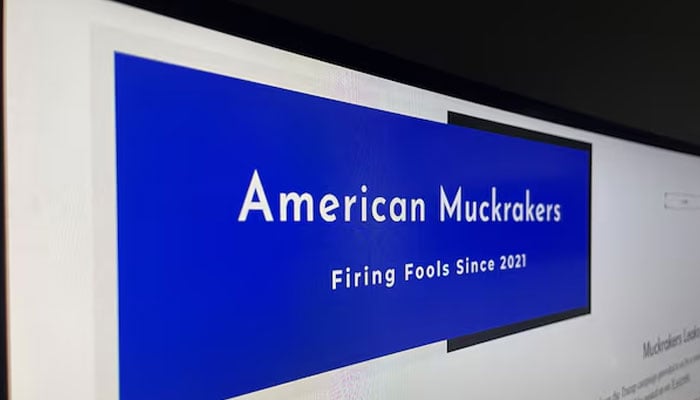Accused Iranian hackers successfully peddle stolen Trump emails
WASHINGTON: The accused Iranian hacking group who intercepted Republican US presidential candidate Donald Trump’s campaign emails have finally found some success in getting their stolen material published after initially failing to interest the mainstream media.
In recent weeks, the hackers began peddling Trump emails more widely to one Democratic political operative, who has posted a trove of material to the website of his political action committee, American Muckrakers, and to independent journalists, at least one of whom posted them on the writing platform Substack. The latest material shows Trump campaign communications with external advisers and other allies, discussing a range of topics leading up to the 2024 election.
The hackers’ activities tracked by Reuters provide a rare glimpse into the operations of an election interference effort. They also demonstrate Iran remains determined to meddle in elections despite a September US Justice Department indictment accusing the leakers of working for Tehran and using a fake persona.
The indictment alleged that an Iranian-government linked hacking group, known as Mint Sandstorm or APT42, compromised multiple Trump campaign staffers between May and June by stealing their passwords. In a Homeland Security advisory published earlier this month, the agency warned that the hackers continue to target campaign staff. If found guilty, they face prison time and fines.
The Department of Justice indictment said the leakers were three Iranian hackers working with Iran’s Basij paramilitary force whose voluntary members help the regime to enforce its strict rules and to project influence. Attempts to reach the hackers identified by name in the indictment via email and text message were unsuccessful.
In conversations with Reuters, the leakers - who collectively use the fake persona “Robert” - did not directly address the US allegations, with one saying “Do you really expect me to answer?!”
“Robert” is the same fake persona referred to in the US indictment, according to FBI emails sent to journalists and reviewed by Reuters.
Iran’s mission to the United Nations said in a statement that reports of the country’s involvement in hacking against the US election were “fundamentally unfounded, and wholly inadmissible,” adding that it “categorically repudiates such accusations.”
The FBI, which is investigating Iran’s hacking activity against both presidential campaigns in this election, declined to comment. David Wheeler, the founder of American Muckrakers, said the documents he shared were authentic and in the public interest. Wheeler said his goal was to “expose how desperate the Trump campaign is to try to win” and to provide the public with factual information. He declined to discuss the material’s origin.
Without making any specific references, the Trump campaign said earlier this month that Iran’s hacking operation was “intended to interfere with the 2024 election and sow chaos throughout our democratic process,” adding any journalists reprinting the stolen documents “are doing the bidding of America’s enemies.”
-
 Woman Jailed Over False 'crime In Space' Claim Against NASA Astronaut
Woman Jailed Over False 'crime In Space' Claim Against NASA Astronaut -
 James Van Der Beek’s Close Pal Reveals Family's Dire Need Of Donations
James Van Der Beek’s Close Pal Reveals Family's Dire Need Of Donations -
 Prince William And Harry's Cousins Attend 'Wuthering Heights' Event
Prince William And Harry's Cousins Attend 'Wuthering Heights' Event -
 Hailey Bieber Turns Heads Just Hours After Major Business Win
Hailey Bieber Turns Heads Just Hours After Major Business Win -
 King Charles' Andrew Decision Labelled 'long Overdue'
King Charles' Andrew Decision Labelled 'long Overdue' -
 Timothee Chalamet 'forever Indebted' To Fan Over Kind Gesture
Timothee Chalamet 'forever Indebted' To Fan Over Kind Gesture -
 Columbia University Sacks Staff Over Epstein Partner's ‘backdoor’ Admission
Columbia University Sacks Staff Over Epstein Partner's ‘backdoor’ Admission -
 Ozzy Osbourne's Family Struggles Behind Closed Doors
Ozzy Osbourne's Family Struggles Behind Closed Doors -
 Dua Lipa Claims Long-distance Relationship 'never Stops Being Hard'
Dua Lipa Claims Long-distance Relationship 'never Stops Being Hard' -
 BTS Moments Of Taylor Swift's 'Opalite' Music Video Unvieled: See Photos
BTS Moments Of Taylor Swift's 'Opalite' Music Video Unvieled: See Photos -
 Robin Windsor's Death: Kate Beckinsale Says It Was Preventable Tragedy
Robin Windsor's Death: Kate Beckinsale Says It Was Preventable Tragedy -
 Rachel Zoe Shares Update On Her Divorce From Rodger Berman
Rachel Zoe Shares Update On Her Divorce From Rodger Berman -
 Kim Kardashian Officially Takes Major Step In Romance With New Boyfriend Lewis Hamilton
Kim Kardashian Officially Takes Major Step In Romance With New Boyfriend Lewis Hamilton -
 YouTube Tests Limiting ‘All’ Notifications For Inactive Channel Subscribers
YouTube Tests Limiting ‘All’ Notifications For Inactive Channel Subscribers -
 'Isolated And Humiliated' Andrew Sparks New Fears At Palace
'Isolated And Humiliated' Andrew Sparks New Fears At Palace -
 Google Tests Refreshed Live Updates UI Ahead Of Android 17
Google Tests Refreshed Live Updates UI Ahead Of Android 17




